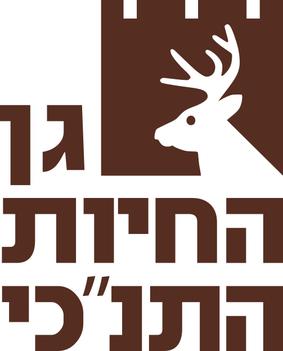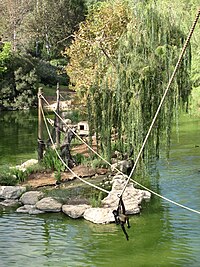Jerusalem Biblical Zoo

Zoo logo
|
|

A black-handed spider monkey swings on a rope over the artificial lake at the zoo
|
|
| Date opened | 1940 |
|---|---|
| Location | Malha, Jerusalem |
| Coordinates | 31°44′58″N 35°10′37″E / 31.74944°N 35.17694°ECoordinates: 31°44′58″N 35°10′37″E / 31.74944°N 35.17694°E |
| Land area | 62-acre (25 ha) |
| No. of animals | 2,200 (as of 2009) |
| No. of species | 271 (as of 2009) |
| Memberships | WAZA,EAZA,IZA,ISIS |
| Website | www |
The Tisch Family Zoological Gardens in Jerusalem (Hebrew: גן החיות התנ"כי בירושלים על שם משפחת טיש, Arabic: حديقة الحيوان الكتابية في أورشليم القدس Ḥadīqat al-Ḥaiwān Ūrushalīm al-Quds), popularly known as the Jerusalem Biblical Zoo, is a zoo located in the Malha neighborhood of Jerusalem, Israel. It is famous for its collection of wildlife featured in the Hebrew Bible, as well as its success in breeding endangered species. According to Dun and Bradstreet, the Biblical Zoo was the most popular tourist attraction in Israel from 2005 to 2007, and logged a record 738,000 visitors in 2009. The zoo had about 55,000 members in 2009.
The Jerusalem Biblical Zoo opened in September 1940 as a small "animal corner" on Rabbi Kook Street in central Jerusalem. The zoo was founded by Aharon Shulov, a professor of zoology at the Hebrew University of Jerusalem, Mount Scopus. Among Shulov's goals were to provide a research facility for his students; to gather animals, reptiles and birds mentioned in the Bible; and, as he wrote in 1951, to break down the "invisible wall" between the intellectuals on Mount Scopus and the general public.
Early on, the zoo ran into several difficulties in its decision to focus on animals mentioned in the Bible. For one, the meaning of many names of animals, reptiles and birds in Scriptures is often uncertain; for example, nesher (Hebrew: נשר), commonly translated as "eagle", could also mean "vulture". More significantly, many of the animals mentioned in the Bible are now extinct in Israel due to over-hunting, destruction of natural habitats by rapid construction and development, illegal poisoning by farmers, and low birth rate. Zoo planners decided to branch beyond strictly biblical animals and include worldwide endangered species as well.
...
Wikipedia
